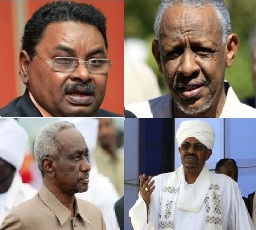North Sudan’s ruling party risks implosion as internal rifts come into view
By Muhammad Osman
April 24, 2011 (NAIROBI) – North Sudan’s governing National Congress Party (NCP) has more than once proved to be able to overcome divisions – but a rare show of discord between senior party officials this week has indicated it might be teetering on the edge of implosion.

The most notable of those was the issue of the International Criminal Court (ICC), whose arrest warrant for President Al-Bashir for atrocities committed in the country’s western region of Darfur prompted analysts to speculate it would shake the NCP’s chain of command.
But it has emerged this week that the NCP’s top leadership is at odds over how to deal with opposition parties and Al-Turabi. Al-Turabi has been detained since January after he warned the government it would face a popular uprising modelled on those seen elsewhere in the Arab world if it continued to resist calls for reforms.
The story began on Friday, 22 April, when the NCP’s Vice-President Nafi Ali Nafi directed criticism at the dialogue conducted with certain opposition parties by his colleague Salah Gosh, the former intelligence chief who currently serves as a presidential adviser for security affairs.
According to Nafi, who was speaking in a radio interview with Sudan Radio, the dialogue led by Gosh under the umbrella of the Presidential Security Advisory, which he chairs, was not sanctioned by the party’s leadership.
Nafi, who often stands out as a hardliner with no qualms about making derogatory remarks against opposition parties, asserted that his party would not negotiate over demands for a transitional or national government to serve as “a tool to weaken” his party or turn it into “a minority group.”
“If they [opposition parties] want this [a national government] they should wait until next elections,” he said.
A day later on Saturday, Salah Gosh held a press conference in which he contradicted his colleague’s statement, stressing that the dialogue he leads was approved by the NCP’s Chairman President Al-Bashir and second Vice-President Ali Osman Mohamed Taha.
“It is [Nafi’s statement] detrimental to the dialogue and will make opposition parties run away from it,” Gosh said, blowing the lid off his dissatisfaction with Nafi’s position.
Sudan’s former Prime minister and leader of the opposition National Umma Party (NUP), Al-Sadiq Al-Mahdi, whose party is currently engaged in dialogue with the NCP over what he loosely terms as “the national agendas,” has previously blamed the wing of hardliners within the NCP for scuttling the National Reconciliation Agreement, which his party signed with the NCP in May 2008.
Further disagreements within the NCP’s leadership were manifested when Nafi denied, in the same interview, the existence of any calls within his party for the release or trial of Al-Turabi, contrasting with statements by the NCP’s Vice-President in Khartoum State Mandour Al-Mahdi who said it was the view of his party that the veteran opposition leader should either be tried or released immediately.
“Anyone who served the legal detention period should be either brought to a trial or released,” Mandor told a press conference on Saturday.
It remains a possibility that the NCP, which has ruled the country since seizing power in a military coup backed by Islamists in 1989, will manage to prevent internal discord from getting any more public than it already is.
But simmering disagreements may lead to implosion which could complicate the party’s situation at a time when it is faced with growing public discontent over lack of political reforms and worsening economic conditions.
The writer is an associate editor of Sudan Tribune. He can be reached on [email protected]
